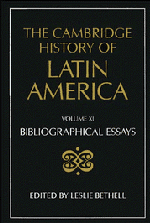Book contents
- Frontmatter
- I THE INDIGENOUS PEOPLES OF MIDDLE AND SOUTH AMERICA ON THE EVE OF THE CONQUEST
- II COLONIAL SPANISH AMERICA
- III COLONIAL BRAZIL
- IV THE INDEPENDENCE OF LATIN AMERICA
- V LATIN AMERICA: ECONOMY, SOCIETY, POLITICS, c. 1820 TO c. 1870
- VI LATIN AMERICA: ECONOMY, SOCIETY, POLITICS, c. 1870 to 1930
- VII LATIN AMERICA: ECONOMY, SOCIETY, POLITICS, 1930 to c. 1990
- VIII IDEAS IN LATIN AMERICA SINCE INDEPENDENCE
- IX LATIN AMERICAN CULTURE SINCE INDEPENDENCE
- 1 Art and literature, c. 1820–c. 1870
- 2 Art and literature, c. 1870–1930
- 3 Narrative since c. 1920
- 4 Poetry since c. 1920
- 5 Indigenous literatures and cultures in the twentieth century
- 6 Art and architecture since c. 1920
- 7 Music since c. 1920
- 8 Cinema
- 9 The mass media
- X THE INTERNATIONAL RELATIONS OF LATIN AMERICA SINCE INDEPENDENCE
- THE CAMBRIDGE HISTORY OF LATIN AMERICA
2 - Art and literature, c. 1870–1930
from IX - LATIN AMERICAN CULTURE SINCE INDEPENDENCE
Published online by Cambridge University Press: 28 March 2008
- Frontmatter
- I THE INDIGENOUS PEOPLES OF MIDDLE AND SOUTH AMERICA ON THE EVE OF THE CONQUEST
- II COLONIAL SPANISH AMERICA
- III COLONIAL BRAZIL
- IV THE INDEPENDENCE OF LATIN AMERICA
- V LATIN AMERICA: ECONOMY, SOCIETY, POLITICS, c. 1820 TO c. 1870
- VI LATIN AMERICA: ECONOMY, SOCIETY, POLITICS, c. 1870 to 1930
- VII LATIN AMERICA: ECONOMY, SOCIETY, POLITICS, 1930 to c. 1990
- VIII IDEAS IN LATIN AMERICA SINCE INDEPENDENCE
- IX LATIN AMERICAN CULTURE SINCE INDEPENDENCE
- 1 Art and literature, c. 1820–c. 1870
- 2 Art and literature, c. 1870–1930
- 3 Narrative since c. 1920
- 4 Poetry since c. 1920
- 5 Indigenous literatures and cultures in the twentieth century
- 6 Art and architecture since c. 1920
- 7 Music since c. 1920
- 8 Cinema
- 9 The mass media
- X THE INTERNATIONAL RELATIONS OF LATIN AMERICA SINCE INDEPENDENCE
- THE CAMBRIDGE HISTORY OF LATIN AMERICA
Summary
The problems of preparing a bibliographical review of Latin American culture flow directly from the problems of the existing bibliographical materials themselves: fragmentary in nature, with few standard works, and many of those inaccessible. Even in literature, by far the most researched of the arts in Latin America, there are few classic histories either of the continent’s literary production as a whole or of that of individual republics. On painting and architecture, as well as music, the existing material for most periods is very sparse indeed. In addition, most works about ‘Latin American’ culture exclude Brazil. Although this review of the period 1870–1930 is intended to stand alone, the reader will also find it useful to consult essay IX:1 on the period 1820–70.
general works on cultural history
Pedro Henríquez Ureña, Historia de la cultura en la América hispánica (Mexico, D.F., 1947), trans., with a supplementary chapter, by G. Chase: A Concise History of Spanish American Culture (New York 1947), although barely more than an annotated check-list, remains the most useful of the general surveys. Also invaluable, if less objective, is G. Arciniegas, El continente de siete colores (Buenos Aires, 1965), Eng. trans. Latin America: A Cultural History (New York, 1966). S. Clissold, Latin America: A Cultural Outline (London, 1965), has appeal for the non-specialist beginner, as does J. Ocampo López, Historia de la cultura hispanoamericana, siglo XX (Bogotá, 1987), whilst J. Franco’s title, Society and the Artist: The Modern Culture of Latin America (London, 1967), has flattered a generation of readers only to deceive them, but remains a stimulating literary introduction.
- Type
- Chapter
- Information
- The Cambridge History of Latin America , pp. 893 - 907Publisher: Cambridge University PressPrint publication year: 1995



